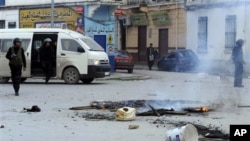Tunisia's president, struggling to contain deadly riots that have destabilized his authority, has made sweeping pledges for political and media reform and said he will leave office when his term ends in 2014.
President Zine El Abidine Ben Ali Thursday also ordered security forces to stop using firearms against demonstrators and slashed prices for staple items such as sugar, milk and bread following deadly protests over food prices and high unemployment.
Mr. Ben Ali announced the new measures in a televised address, amid the country's worst civil unrest in his 23 years in power.
It remains unclear whether the president's speech will calm the violence that Tunisian officials say has left 23 people dead. Rights groups and witnesses say the death toll is significantly higher.
Unions and protesters vowed to pursue strikes already called in various cities for Friday, including the capital, Tunis.
News agencies say police killed three people in clashes late Thursday in the Tunis suburb of Kram, despite a nighttime curfew in the capital. Two more people were reportedly killed in the central Tunisian town of Kairouan.
Earlier Thursday, France broke its silence over the violence in its former colonial power, with French Prime Minister Francois Fillon condemning Tunisian authorities' "disproportionate" use of force.
The U.N. High Commissioner for Human Rights also urged the government to stop security forces from using excessive force against protesters.
Meanwhile, the State Department advised U.S. citizens to avoid non-essential travel to the North African country. European nations also issued travel warnings after riots broke out in Mediterranean beach resorts popular with European tourists.
The unrest began in December when a 26-year-old unemployed university graduate set himself on fire after police confiscated his produce. Authorities said he was selling without a permit.
Nationwide protests over joblessness and police crackdowns first erupted in the western Sidi Bouzid region but quickly spread across the country and this week finally engulfed the capital.
Tunisian Prime Minister Mohamed Ghannouchi announced Wednesday that he had fired and replaced the country's interior minister. The government also announced Wednesday that authorities would release demonstrators who had been arrested earlier in the unrest.
Some information for this report provided by AFP, AP and Reuters.




